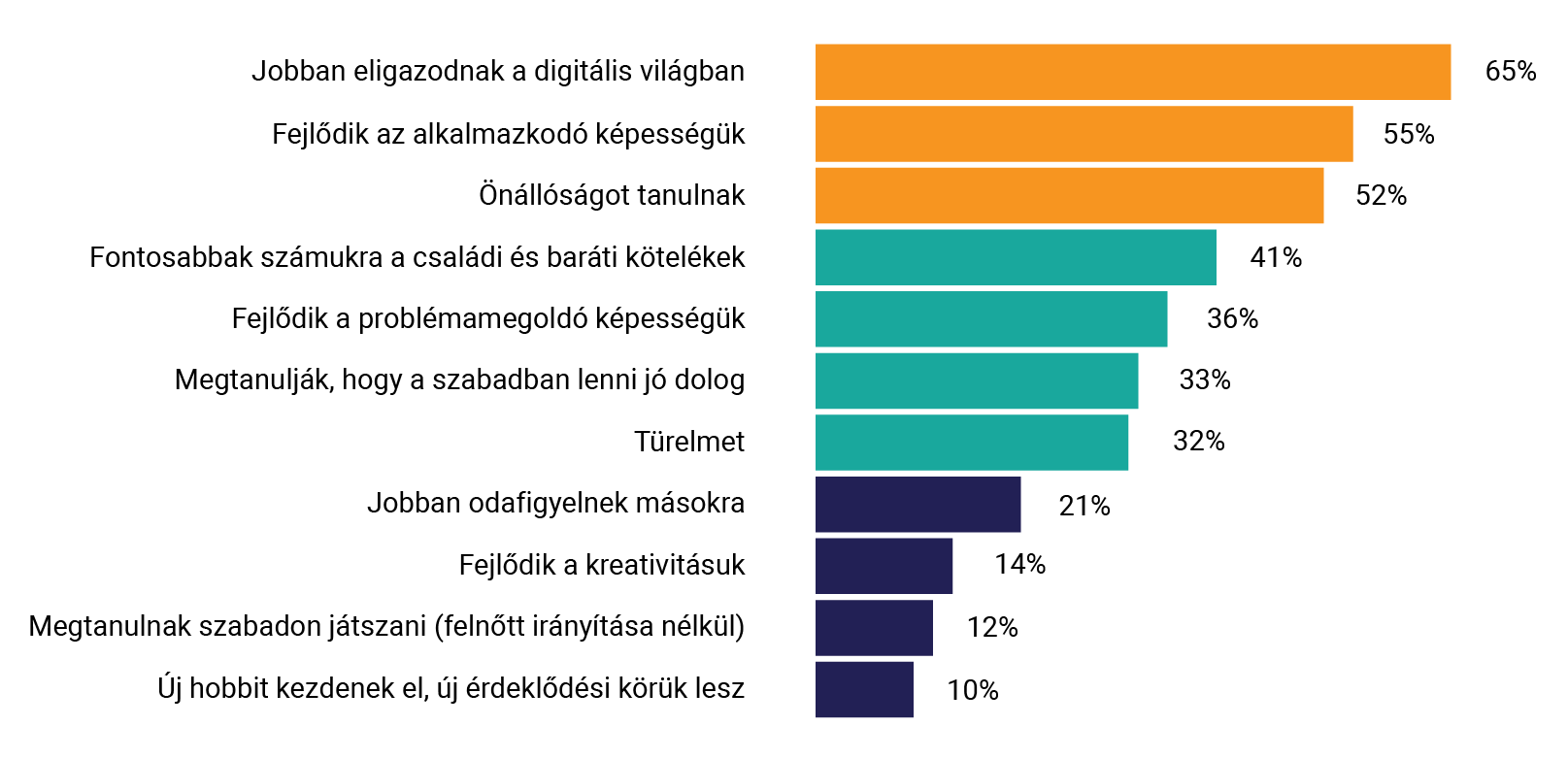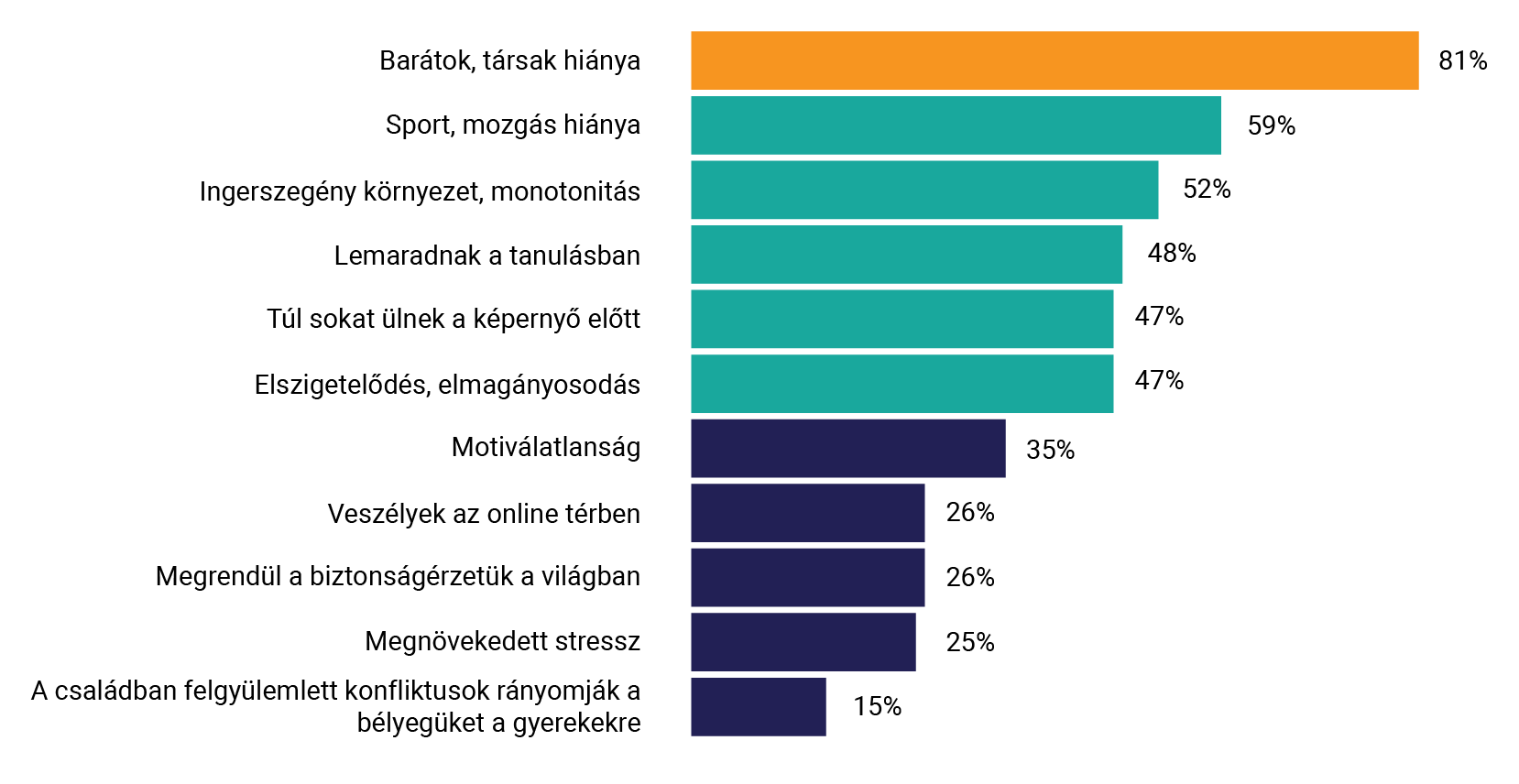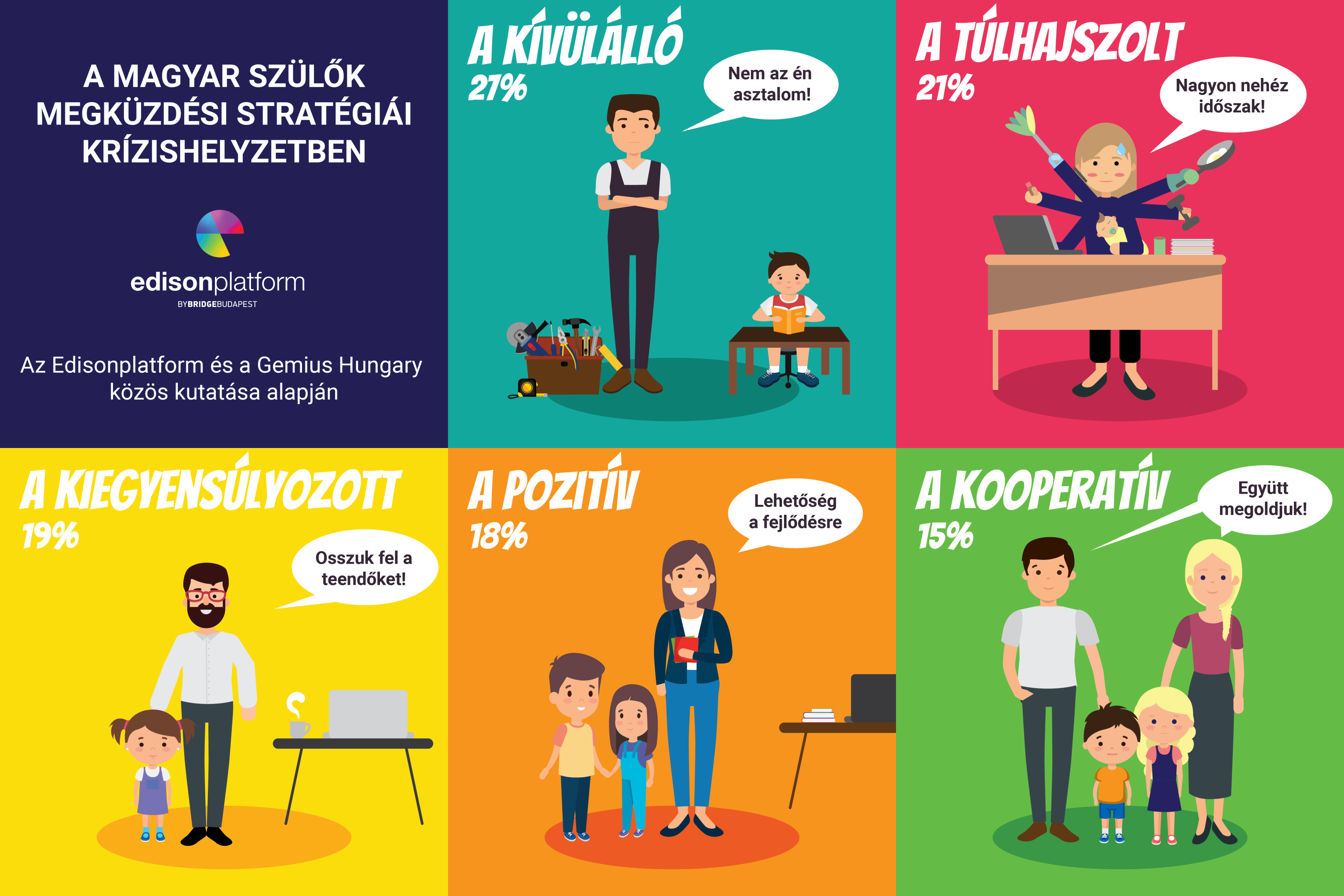
“The spring months have shown that what we have long suspected will be indispensable in the future are not only theories or future sci-fi scenarios, but are already key today: adaptability, problem-solving, creativity have been essential to survive the past. and children alike, ”said Rita Veres, strategic manager at Edisonplatform. The two most important family benefits of recent storms: 56% of respondents learned a lot from this difficult period, and on the other hand, there was more conversation and attention in families (46%). The children learned independence and became more friends with the digital space. The biggest danger that children can bear in the long run and have to deal with is the lack of peers and friends. The biggest concern of Hungarian parents, according to 8 out of 10 respondents, is that children have lost touch with their friends, and even 5 out of 10 parents have identified loneliness, isolation as the most critical long-term danger in their lives.
The research was carried out by Edisonplatform together with Gemius Hungary and represents the Hungarian Internet-using population over the age of 18, who are raising children aged 3-14. “Our main goal was to see a clear picture even in a very emotional and turbulent period, and to understand how the past months have affected the lives of families, children, how they have struggled, to help draw lessons and thus prepare for the future. . This is important to us as well, which is why we supported the research. ” Said Borbála Baittrok, research manager at Gemius Hungary. And it was possible to learn, and not a little, and this was confirmed by the respondents, 56 percent said that they had learned a lot from the difficulties of recent months, so it became the most important benefit of the difficult period.
What do you need to thrive in life?
“In the future, in addition to specialized expertise, the skills that are relevant in any situation and in any unexpected, dynamically changing profession, industry or world will be appreciated. What will be important is whether we dare to adapt to the challenges, relying on our courage, curiosity and creativity – and this is what we need to teach and encourage children to do. The months behind us have clearly shown that these are key today, not just in the future, ”said Rita Veres, Head of Strategy at Edisonplatform.
The top list of Hungarian parents included communication, perseverance, problem solving and adaptability when we asked them what their children need to thrive well in life, and these also preceded factors such as a good profession or subject knowledge. Moms and dads see this picture a little differently: moms ranked higher in endurance and self-knowledge, while dads had more emphasis on adaptability, collaboration, and orientation in the digital world, and they also rated financial literacy higher.
What do children need to thrive in the world? – Top list by parents

Are we ready for digital education?
Without classifying digital education, parents ’opinions showed that computers were not the biggest problem, most families were able to solve it either on their own or with a loan, alternating use. However, 9 out of 10 parents felt that digital learning meant that children were given tasks to be returned, and only three out of ten said that children had attended online lessons, with 14% reporting that teachers they think about the needs of the children beyond the lessons and, for example, organize a conversation with the children. The digital switchover went easily for 4 out of 10 families, but caused difficulty for 24% of them and placed a much greater burden on their lower educational attainment, among whom one in two families struggled to switch. One-third of respondents said it would be worthwhile to preserve some elements of digital education.
What did we win and what did we lose?
More conversation, and more attention to each other, that was the positive pan of the past. Not only did the children have more time to learn than before, but they also had time to relax with them. In addition, the most important benefit for the children, according to the parents, was that they were better able to navigate the digital world, also learned independence and developed their adaptability.
Women faced more burdens, the biggest problem was that it was very difficult to reconcile work and working with a child (women: 58% vs. men: 33%), and they felt much less at home that there was a division of family work, interesting way, 47 percent of men felt they shared a chore, while only 22 percent of women reported it. Not surprisingly, in this situation, women also agreed much more strongly with the statement that they feel alone with their problems (20% vs. 10%). This situation in mothers tended to lead to the realization that it was worthwhile to change family life (women: 30% vs. men: 14%).
What do children learn in this difficult situation that they can benefit from in the future?

The most common practice was to talk to the children, 67% of the respondents handled the situation by honestly trying to talk to the children and parents trying to create time for joint family programs and games. Humor in difficult situations, setting the agenda, or everyday exercise are in the middle. Fewer thought that a healthy meal, limiting the time spent in front of the screen, or dissolving in creative activities could also play an important role in a difficult time.
What danger should we pay attention to?
The highest risk of the recent period, which can affect children in the long run, is the lack of friends and companions (81%). But in addition, lack of movement, monotony and a stimulus-poor environment, and too much screen usage have become top-notch (interestingly, parents are concerned about this, yet few restrict it, with one in four families having principles to do so). Forty-eight percent of parents are worried that their children are lagging behind in learning, and about a quarter of parents fear that their child has a shaky sense of security in the world.
What is the biggest disadvantage of the coronavirus situation, which can have a negative impact on children’s lives even in the long run?

The problem of loneliness is critical because if our relationships are compromised, there are many consequences, and our relationships are the most important safety net in difficult situations and can also provide a strong foundation for resilience. Even further, they are key because in the world of the future of work, they lay the foundation for teams, cooperation, empathy for others.
Understanding the balance sheet of the recent period will help to replace the short-term face of the crisis with long-term, future-oriented thinking. Crises are not to be forgotten, but to be made aware of what they have brought into our lives, what we have learned from it, so that we can develop.
In recent months, the parents of the internet have clashed, there was a group of happy family pleasures, leaveners and happy plasticizers, and the other side who struggled desperately to have their teachers, parents, friends with their children and go to hell. At least that’s how it seems at first glance when browsing parent group posts on social media. Would it be that simple? And what was the most typical parental life situation and strategy in Hungary?

The crisis of recent months has affected the lives of families in many ways, and they have not experienced it in the same way, different life situations and coping strategies have emerged. We were curious about these, and the joint research of Edisonplatform and Gemius Hungary sought to answer, among other things, how the past few months have affected the lives of children and families, how they have overcome difficulties. “Our main goal was to see a clear picture even in a very emotional and turbulent period, and to learn from the past,” said Rita Veres, head of strategy at Edisonplatform. The research was carried out by Edisonplatform together with Gemius Hungary and represents the Hungarian Internet-using population over the age of 18, who are raising children aged 3-14.
“We identified five different types of parents, from overworked to outsider. We do not want to evaluate individual strategies, because we must not forget that everyone’s opportunities and background also significantly influenced how they were able to adapt to the challenges. It’s also important to see the repertoire of situations and strategies, even to face which ones we belong to and what we can learn from them. ” said Rita Veres, chief strategic officer of Edisonplatform.
The outsider – “Not my task” (27%)
Let’s start with perhaps the simplest strategy, where the situation hasn’t changed as a result of the crisis of recent months, there has been no change in the division of labor, no more conversation in the family, and no learning with your child. Typically, this strategy developed for those who continued to have to go to work, raise younger children, live in smaller settlements, and have a primary education, and it is a “masculine” group (i.e., men are overrepresented in this group).
The overwhelmed – “Very difficult period” (21%)
Overworked people struggled with significant financial problems and family conflicts at the same time. In the context of the latter, the crisis did not bring the family together, they no longer communicated with each other, and even the members of this group felt alone with the problems. They had a hard time reconciling work and dealing with children, and they learned a lot with the children, which they had a very hard time experiencing. Nevertheless, the quality of time spent together by the TV and computer became less for the children. Their main concern is that children are lagging behind in learning, losing motivation, and family conflicts also have their mark on children’s well-being. In this group, women living in the city (36-49 years old) who had to go to work invariably were overrepresented.
The Balanced – “Let’s Share Things To Do” (19%)
For this group, the crisis has brought positive changes in family life: everyone has had more conversations and attention to each other, and they have changed the division of labor in the family to balance the burdens. They coped more easily with reconciling work and learning with children, and the digital switchover did not cause much difficulty because members of this group move more homely in the digital space. Humor, the introduction of an agenda, or creative activities as a part of coping practices appeared more typically in them. Among the members of the group, the capital, people with higher education and men are more present.
The positive – “Opportunity for development” (18%)
They are the ones who feel that there is a lot to learn from a difficult time, and this is also true for family life, they realized that it is worth changing in family life, and they were not afraid to discuss this with each other. The division of labor in the family has also improved. They also paid attention to their own development. This group is no stranger to the digital world, and it has become easier for them to make the digital switchover, and they even feel some elements would be worth keeping in the future. They also perceived the dangers of digital space, their main concerns about their children were related to the dangers of online space and the time spent in front of the screen, and they also sought to balance this with daily exercise. Among the “positives,” there are more typically women with secondary and tertiary education who live in cities and have either worked a lot from home so far or have had to travel less.
The cooperative – “We solve it together!” (15%)
The members of the group found themselves in a difficult financial situation, and while it was very difficult for them to coordinate work and activities related to the children and they could hardly wait for school and kindergarten to start, they chose to work together within the family. They don’t feel alone with the problems and there is less conflict in the family life. The “cooperatives” are unfamiliar with the digital world, have found it harder to make the transition, and don’t even want parts of online education to remain. They were more concerned than average about shaking children’s sense of security in the world, so as a coping practice, they talked more with their children about their post-quarantine plans. Men and women are in the group to a similar extent, and cooperatives were more likely to have primary and secondary education in the smaller settlement.